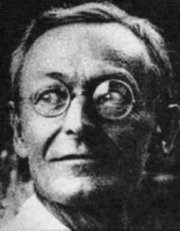Hermann Hesse
|
|
Hermann Hesse (July 2, 1877 – August 9, 1962) was a German author, and the winner of the 1946 Nobel Prize in literature. He is most famous for his novels Steppenwolf and Das Glasperlenspiel (The Glass Bead Game).
Hesse's interests in existential, spiritual, and mystical themes and Buddhist and Hindu philosophy may be seen in his works.
Born on July 2, 1877 in Calw, Württemberg, Hesse emigrated to Switzerland in 1912 and in 1923 became a Swiss citizen.
A staunch pacifist, Hesse opposed World War I strongly. The residual fallout of his feelings towards war can be seen in many of his books. During World War II his writings found strange allies. The German propagandist Joseph Goebbels initially defended Hesse's books, and as a result he was allowed to continue writing unmolested. However, after he demanded that certain portions in his book Narcissus and Goldmund dealing with pogroms be left untouched, he found himself on the Nazis' blacklist. Despite this ominous situation Hesse escaped World War II unharmed.
Like a number of his characters, Hesse had many problems throughout his life with women. His first marriage with Maria Bernoulli, with whom he had three children, ended sadly, his wife having mental problems. His second marriage was apparently a brief fling with Ruth Wenger, lasting only a few months. He finally married Ninon Dolbin in 1931 and remained with her for the rest of his life.
He developed a certain conservatism in his later life—in Das Glasperlenspiel, characters denounce all music after Johann Sebastian Bach as superficial and bad, with Ludwig van Beethoven being an extreme example of bad taste.
Das Glasperlenspiel, with its William Morris-like idealised medieval style was extremely popular in the war-torn Germany of 1945.
He died of cerebral hemorrhage in his sleep in Montagnola at the age of 85.
Bibliography
- 1904 - Peter Camenzind
- 1906 - Beneath the Wheel aka The Prodigy (Unterm Rad)
- 1910 - Gertrude (Gertrud)
- 1914 - Rosshalde
- 1915 - Knulp
- 1919 - Demian
- 1919 - Klein und Wagner
- 1919 - Strange News from Another Star (Märchen) – short stories
- 1920 - Klingsor's Last Summer (Klingsors letzter Sommer) – 3 novellas
- 1922 - Siddhartha
- 1927 - Steppenwolf (Der Steppenwolf)
- 1930 - Narcissus and Goldmund (Narziss und Goldmund)
- 1932 - Journey to the East (Die Morgenlandfahrt)
- 1937 - Autobiographical Writings (Gedenkblätter) – essays
- 1942 - Poems (Die Gedichte) – poems
- 1943 - The Glass Bead Game aka Magister Ludi (Das Glasperlenspiel)
- 1946 - If the War Goes On ... (Krieg und Frienden) – essays
- 1976 - My Belief: Essays on Life and Art – essays
- 1995 - The Complete Fairy Tales of Hermann Hesse – fairy tales
Awards
- 1936 - Gottfried-Keller-Preis
- 1946 - Nobel Prize in Literature
- 1946 - Goethepreis der Stadt Frankfurt
- 1950 - Wilhelm-Raabe-Preis
- 1955 - Friedenspreis des Deutschen Buchhandels
External links and references
Template:Wikiquote Template:Wikisource author
- Germanic American Institute biography (http://courseweb.stthomas.edu/paschons/language_http/essays/hesse.html) discussing Hesse's interest in Indian philosophies and his lifelong appeal to young people, which peaked in the 1960s and 1970s.
- Project Gutenberg entry (http://www.gutenberg.net/catalog/world/authrec?fk_authors=941) with full text of Siddhartha, in German and English.
- Pegasos (http://www.kirjasto.sci.fi/hhesse.htm). Hermann Hesse.
- Germanic, Slavic & Semitic Studies; The University of California (http://www.gss.ucsb.edu/projects/hesse) Hermann Hesse.da:Hermann Hesse
de:Hermann Hesse et:Hermann Hesse es:Hermann Hesse eo:Hermann HESSE fr:Hermann Hesse gd:Hermann Hesse he:הרמן הסה ja:ヘルマン・ヘッセ ka:ჰესე, ჰერმან ku:Hermann Hesse lv:Hermanis Hese nl:Hermann Hesse no:Hermann Hesse pl:Hermann Hesse pt:Hermann Hesse ru:Гессе, Герман sl:Hermann Hesse fi:Hermann Hesse sv:Hermann Hesse vi:Hermann Hesse uk:Гессе Герман

